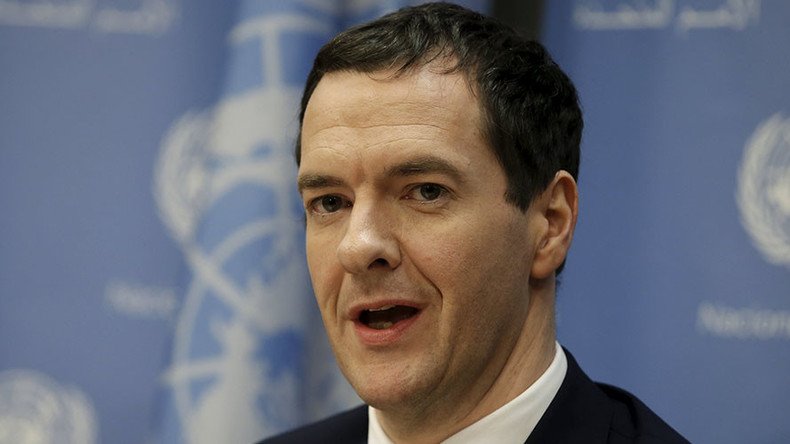Osborne wrong to flag global economic threats, austerity is the problem – economists

Britain’s economy is embarking on “mission critical” in 2016 as a “dangerous cocktail” of global economic threats continues to fester abroad, Chancellor George Osborne has said.
Speaking to BBC Radio 4 on Wednesday, Osborne warned against complacency over Britain’s economic recovery and insisted a continued path of austerity is vital.
The chancellor’s comments were issued ahead of a speech he made in Wales on Thursday.
Addressing business chiefs in a Cardiff Bay hotel, Osborne branded political opponents to austerity irresponsible in an effort to defend his long-term economic plan.
He argued slowed growth in China, recessions in Russia and Brazil, instability in the Middle East and the plunging cost of crude oil are potentially hazardous to Britain. Against a backdrop of global economic turmoil, the chancellor said the only way of thwarting these risks is to continue slashing the deficit and curbing spending.
"Britain still has big economic problems it needs to fix." Osborne just admitted that 5 years of vicious, punishing austerity hasn't worked.
— Rob Crute (@BlackhallRob) January 7, 2016Critics have sharply criticized Osborne's speech, saying it amounts to a defense of his austerity project.
Senior researcher at the New Economics Foundation (NEF) Christine Berry said the chancellor’s austerity obsession ignores the corresponding surge in household debt, which is the “real risk” to Britain’s economy.
Speaking to RT, she warned the UK’s inflated “casino banking sector” leaves Britain vulnerable to “global economic shocks.”
“The complacency, which is currently setting in about the effectiveness of post-crisis banking regulation is wholly unjustified,” Berry said.
“Much more serious structural reform is needed to build a financial system which genuinely serves the real economy and makes us resilient to future shocks.”
Osborne ought to know, he created most of the problems... #austerity#SurplusLock#HousingBubble#Floodinghttps://t.co/22UuWVFufe
— Joel Benjamin (@Gian_TCatt) January 7, 2016Economist Michael Burke also contradicted the chancellor’s analysis, insisting “renewed austerity will deepen the slowdown in the British economy because it will cut both investment and consumption.”
Speaking to RT, he said “it’s a bit rich” of Osborne to talk of complacency because he has been promoting it since 2013 to ensure the Tories were re-elected.
Burke described a recent slowdown in UK economic growth as “homegrown,” and insisted Osborne cannot attribute this to economic turmoil in China, Russia or the Middle East.
“In reality, Britain exports very little to these countries and its main trading partner is the EU, which is recovering a little from near-zero growth,” he said.
Osborne's policy isn't working & promises 5 more years Austerity - For who? not the top 1% - Not all in it together! https://t.co/K5hZfoiHvW
— Geoff Clegg (@jedclef) January 7, 2016Although the chancellor told business chiefs in Cardiff the government’s economic plan delivers growth, supports business, has increased employment and leads to rising wages, Burke said this is untrue.
“Osborne's entire policy has delivered misery and a cut in real wages, combined with house price inflation,” he said, noting that manufacturing and productivity have also slumped.
“At the same time the chancellor has loosened the regulation of the finance sector in order to promote another misallocation of resources to housing and consumption,” Burke added.
Burke called on the government to alter its approach and allocate resources towards productive investment.
Osborne told business leaders in Cardiff that calls for higher spending and an end to austerity are predictable but misguided.
“Anyone who thinks it’s mission accomplished with the British economy is making a grave mistake,” he said.
“I worry about a creeping complacency in the national debate about our economy. A sense that the hard work at home is complete and that we’re immune from the risks abroad. A sense we can let up, and the good economic news will just keep rolling in.”
Osborne's austerity is not the solution to Britain's continuing economic problems. In large part, it is their cause.
— Jon Trickett (@jon_trickett) January 7, 2016The chancellor said Britain's economy has performed "better than almost anyone dared to hope."
But he warned that the state's economic recovery could be derailed unless the government persists with its austerity agenda.
Political economist and tax expert Richard Murphy dismissed this claim and condemned the chancellor's economic strategy.
Writing in a blogpost on Thursday, Murphy argued that Osborne's economic policies “exacerbate the obvious downward cyclical trend in the UK and global economy at this point in time.”
Murphy said at a time when investment is absolutely vital for the economy, the government is refusing to deliver it despite being able to do so.












